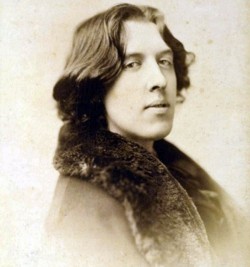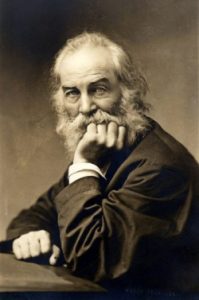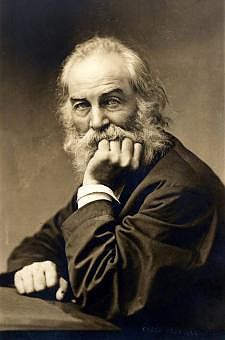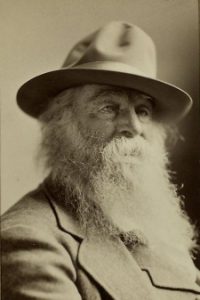Fleurs du Mal Magazine


Or see the index

Symphony In Yellow
An omnibus across the bridge
Crawls like a yellow butterfly,
And, here and there a passer-by
Shows like a little restless midge.
Big barges full of yellow hay
Are moored against the shadowy wharf,
And, like a yellow silken scarf,
The thick fog hangs along the quay.
The yellow leaves begin to fade
And flutter from the temple elms,
And at my feet the pale green Thames
Lies like a rod of rippled jade.
Oscar Wilde
(1854 – 1900)
Symphony In Yellow
• fleursdumal.nl magazine
More in: Archive W-X, Archive W-X, Wilde, Oscar, Wilde, Oscar

Ballade De Marguerite
(Normande)
I am weary of lying within the chase
When the knights are meeting in market-place.
Nay, go not thou to the red-roofed town
Lest the hoofs of the war-horse tread thee down.
But I would not go where the Squires ride,
I would only walk by my Lady’s side.
Alack! and alack! thou art overbold,
A Forester’s son may not eat off gold.
Will she love me the less that my Father is seen
Each Martinmas day in a doublet green?
Perchance she is sewing at tapestrie,
Spindle and loom are not meet for thee.
Ah, if she is working the arras bright
I might ravel the threads by the fire-light.
Perchance she is hunting of the deer,
How could you follow o’er hill and mere?
Ah, if she is riding with the court,
I might run beside her and wind the morte.
Perchance she is kneeling in St. Denys,
(On her soul may our Lady have gramercy!)
Ah, if she is praying in lone chapelle,
I might swing the censer and ring the bell.
Come in, my son, for you look sae pale,
The father shall fill thee a stoup of ale.
But who are these knights in bright array?
Is it a pageant the rich folks play?
‘T is the King of England from over sea,
Who has come unto visit our fair countrie.
But why does the curfew toll sae low?
And why do the mourners walk a-row?
O ‘t is Hugh of Amiens my sister’s son
Who is lying stark, for his day is done.
Nay, nay, for I see white lilies clear,
It is no strong man who lies on the bier.
O ‘t is old Dame Jeannette that kept the hall,
I knew she would die at the autumn fall.
Dame Jeannette had not that gold-brown hair,
Old Jeannette was not a maiden fair.
O ‘t is none of our kith and none of our kin,
(Her soul may our Lady assoil from sin!)
But I hear the boy’s voice chaunting sweet,
‘Elle est morte, la Marguerite.’
Come in, my son, and lie on the bed,
And let the dead folk bury their dead.
O mother, you know I loved her true:
O mother, hath one grave room for two?
Oscar Wilde
(1854 – 1900)
Ballade De Marguerite
(Normande)
• fleursdumal.nl magazine
More in: Archive W-X, Archive W-X, Wilde, Oscar, Wilde, Oscar

The Garden of Eros
IT is full summer now, the heart of June,
Not yet the sun-burnt reapers are a-stir
Upon the upland meadow where too soon
Rich autumn time, the season’s usurer,
Will lend his hoarded gold to all the trees,
And see his treasure scattered by the wild and spendthrift breeze.
Too soon indeed! yet here the daffodil,
That love-child of the Spring, has lingered on
To vex the rose with jealousy, and still
The harebell spreads her azure pavilion,
And like a strayed and wandering reveller
Abandoned of its brothers, whom long since June’s messenger
The missel-thrush has frighted from the glade,
One pale narcissus loiters fearfully
Close to a shadowy nook, where half afraid
Of their own loveliness some violets lie
That will not look the gold sun in the face
For fear of too much splendour,—ah! methinks it is a place
Which should be trodden by Persephone
When wearied of the flowerless fields of Dis!
Or danced on by the lads of Arcady!
The hidden secret of eternal bliss
Known to the Grecian here a man might find,
Ah! you and I may find it now if Love and Sleep be kind.
There are the flowers which mourning Herakles
Strewed on the tomb of Hylas, columbine,
Its white doves all a-flutter where the breeze
Kissed them too harshly, the small celandine,
That yellow-kirtled chorister of eve,
And lilac lady’s-smock,—but let them bloom alone, and leave
Yon spired holly-hock red-crocketed
To sway its silent chimes, else must the bee,
Its little bellringer, go seek instead
Some other pleasaunce; the anemone
That weeps at daybreak, like a silly girl
Before her love, and hardly lets the butterflies unfurl
Their painted wings beside it,—bid it pine
In pale virginity; the winter snow
Will suit it better than those lips of thine
Whose fires would but scorch it, rather go
And pluck that amorous flower which blooms alone,
Fed by the pander wind with dust of kisses not its own.
The trumpet-mouths of red convolvulus
So dear to maidens, creamy meadow-sweet
Whiter than Juno’s throat and odorous
As all Arabia, hyacinths the feet
Of Huntress Dian would be loth to mar
For any dappled fawn,—pluck these, and those fond flowers which are
Fairer than what Queen Venus trod upon
Beneath the pines of Ida, eucharis,
That morning star which does not dread the sun,
And budding marjoram which but to kiss
Would sweeten Cytheræa’s lips and make
Adonis jealous,—these for thy head,—and for thy girdle take
Yon curving spray of purple clematis
Whose gorgeous dye outflames the Tyrian King,
And fox-gloves with their nodding chalices,
But that one narciss which the startled Spring
Let from her kirtle fall when first she heard
In her own woods the wild tempestuous song of summer’s bird,
Ah! leave it for a subtle memory
Of those sweet tremulous days of rain and sun,
When April laughed between her tears to see
The early primrose with shy footsteps run
From the gnarled oak-tree roots till all the wold,
Spite of its brown and trampled leaves, grew bright with shimmering gold.
Nay, pluck it too, it is not half so sweet
As thou thyself, my soul’s idolatry!
And when thou art a-wearied at thy feet
Shall oxlips weave their brightest tapestry,
For thee the woodbine shall forget its pride
And vail its tangled whorls, and thou shalt walk on daisies pied.
And I will cut a reed by yonder spring
And make the wood-gods jealous, and old Pan
Wonder what young intruder dares to sing
In these still haunts, where never foot of man
Should tread at evening, lest he chance to spy
The marble limbs of Artemis and all her company.
And I will tell thee why the jacinth wears
Such dread embroidery of dolorous moan,
And why the hapless nightingale forbears
To sing her song at noon, but weeps alone
When the fleet swallow sleeps, and rich men feast,
And why the laurel trembles when she sees the lightening east.
And I will sing how sad Proserpina
Unto a grave and gloomy Lord was wed,
And lure the silver-breasted Helena
Back from the lotus meadows of the dead,
So shalt thou see that awful loveliness
For which two mighty Hosts met fearfuly in war’s abyss!
And then I ’ll pipe to thee that Grecian tale
How Cynthia loves the lad Endymion,
And hidden in a grey and misty veil
Hies to the cliffs of Latmos once the Sun
Leaps from his ocean bed in fruitless chase
Of those pale flying feet which fade away in his embrace.
And if my flute can breathe sweet melody,
We may behold Her face who long ago
Dwelt among men by the Ægean sea,
And whose sad house with pillaged portico
And friezeless wall and columns toppled down
Looms o’er the ruins of that fair and violet-cinctured town.
Spirit of Beauty! tarry still a-while,
They are not dead, thine ancient votaries,
Some few there are to whom thy radiant smile
Is better than a thousand victories,
Though all the nobly slain of Waterloo
Rise up in wrath against them! tarry still, there are a few.
Who for thy sake would give their manlihood
And consecrate their being, I at least
Have done so, made thy lips my daily food,
And in thy temples found a goodlier feast
Than this starved age can give me, spite of all
Its new-found creeds so sceptical and so dogmatical.
Here not Cephissos, not Ilissos flows,
The woods of white Colonos are not here,
On our bleak hills the olive never blows,
No simple priest conducts his lowing steer
Up the steep marble way, nor through the town
Do laughing maidens bear to thee the crocus-flowered gown.
Yet tarry! for the boy who loved thee best,
Whose very name should be a memory
To make thee linger, sleeps in silent rest
Beneath the Roman walls, and melody
Still mourns her sweetest lyre, none can play
The lute of Adonais, with his lips Song passed away.
Nay, when Keats died the Muses still had left
One silver voice to sing his threnody,
But ah! too soon of it we were bereft
When on that riven night and stormy sea
Panthea claimed her singer as her own,
And slew the mouth that praised her; since which time we walk alone,
Save for that fiery heart, that morning star
Of re-arisen England, whose clear eye
Saw from our tottering throne and waste of war
The grand Greek limbs of young Democracy
Rise mightily like Hesperus and bring
The great Republic! him at least thy love hath taught to sing,
And he hath been with thee at Thessaly,
And seen white Atalanta fleet of foot
In passionless and fierce virginity
Hunting the tuskéd boar, his honied lute
Hath pierced the cavern of the hollow hill,
And Venus laughs to know one knee will bow before her still.
And he hath kissed the lips of Proserpine,
And sung the Galilæan’s requiem,
That wounded forehead dashed with blood and wine
He hath discrowned, the Ancient Gods in him
Have found their last, most ardent worshipper,
And the new Sign grows grey and dim before its conqueror.
Spirit of Beauty! tarry with us still,
It is not quenched the torch of poesy,
The star that shook above the Eastern hill
Holds unassailed its argent armoury
From all the gathering gloom and fretful fight—
O tarry with us still! for through the long and common night,
Morris, our sweet and simple Chaucer’s child,
Dear heritor of Spenser’s tuneful reed,
With soft and sylvan pipe has oft beguiled
The weary soul of man in troublous need,
And from the far and flowerless fields of ice
Has brought fair flowers meet to make an earthly paradise.
We know them all, Gudrun the strong men’s bride,
Aslaug and Olafson we know them all,
How giant Grettir fought and Sigurd died,
And what enchantment held the king in thrall
When lonely Brynhild wrestled with the powers
That war against all passion, ah! how oft through summer hours,
Long listless summer hours when the noon
Being enamoured of a damask rose
Forgets to journey westward, till the moon
The pale usurper of its tribute grows
From a thin sickle to a silver shield
And chides its loitering car—how oft, in some cool grassy field
Far from the cricket-ground and noisy eight,
At Bagley, where the rustling bluebells come
Almost before the blackbird finds a mate
And overstay the swallow, and the hum
Of many murmuring bees flits through the leaves,
Have I lain poring on the dreamy tales his fancy weaves,
And through their unreal woes and mimic pain
Wept for myself, and so was purified,
And in their simple mirth grew glad again;
For as I sailed upon that pictured tide
The strength and splendour of the storm was mine
Without the storm’s red ruin, for the singer is divine,
The little laugh of water falling down
Is not so musical, the clammy gold
Close hoarded in the tiny waxen town
Has less of sweetness in it, and the old
Half-withered reeds that waved in Arcady
Touched by his lips break forth again to fresher harmony.
Spirit of Beauty tarry yet a-while!
Although the cheating merchants of the mart
With iron roads profane our lovely isle,
And break on whirling wheels the limbs of Art,
Ay! though the crowded factories beget
The blind-worm Ignorance that slays the soul, O tarry yet!
For One at least there is,—He bears his name
From Dante and the seraph Gabriel,—
Whose double laurels burn with deathless flame
To light thine altar; He too loves thee well,
Who saw old Merlin lured in Vivien’s snare,
And the white feet of angels coming down the golden stair,
Loves thee so well, that all the World for him
A gorgeous-coloured vestiture must wear,
And Sorrow take a purple diadem,
Or else be no more Sorrow, and Despair
Gild its own thorns, and Pain, like Adon, be
Even in anguish beautiful;—such is the empery
Which Painters hold, and such the heritage
This gentle solemn Spirit doth possess,
Being a better mirror of his age
In all his pity, love, and weariness,
Than those who can but copy common things,
And leave the Soul unpainted with its mighty questionings.
But they are few, and all romance has flown,
And men can prophesy about the sun,
And lecture on his arrows—how, alone,
Through a waste void the soulless atoms run,
How from each tree its weeping nymph has fled,
And that no more ’mid English reeds a Naïad shows her head.
Methinks these new Actæons boast too soon
That they have spied on beauty; what if we
Have analyzed the rainbow, robbed the moon
Of her most ancient, chastest mystery,
Shall I, the last Endymion, lose all hope
Because rude eyes peer at my mistress through a telescope!
What profit if this scientific age
Burst through our gates with all its retinue
Of modern miracles! Can it assuage
One lover’s breaking heart? what can it do
To make one life more beautiful, one day
More god-like in its period? but now the Age of Clay
Returns in horrid cycle, and the earth
Hath borne again a noisy progeny
Of ignorant Titans, whose ungodly birth
Hurls them against the august hierarchy
Which sat upon Olympus, to the Dust
They have appealed, and to that barren arbiter they must
Repair for judgment, let them, if they can,
From Natural Warfare and insensate Chance,
Create the new Ideal rule for man!
Methinks that was not my inheritance;
For I was nurtured otherwise, my soul
Passes from higher heights of life to a more supreme goal.
Lo! while we spake the earth did turn away
Her visage from the God, and Hecate’s boat
Rose silver-laden, till the jealous day
Blew all its torches out: I did not note
The waning hours, to young Endymions
Time’s palsied fingers count in vain his rosary of suns!—
Mark how the yellow iris wearily
Leans back its throat, as though it would be kissed
By its false chamberer, the dragon-fly,
Who, like a blue vein on a girl’s white wrist,
Sleeps on that snowy primrose of the night,
Which ’gins to flush with crimson shame, and die beneath the light.
Come let us go, against the pallid shield
Of the wan sky the almond blossoms gleam,
The corn-crake nested in the unmown field
Answers its mate, across the misty stream
On fitful wing the startled curlews fly,
And in his sedgy bed the lark, for joy that Day is nigh,
Scatters the pearléd dew from off the grass,
In tremulous ecstasy to greet the sun,
Who soon in gilded panoply will pass
Forth from yon orange-curtained pavilion
Hung in the burning east, see, the red rim
O’ertops the expectant hills! it is the God! for love of him
Already the shrill lark is out of sight,
Flooding with waves of song this silent dell,—
Ah! there is something more in that bird’s flight
Than could be tested in a crucible!—
But the air freshens, let us go,—why soon
The woodmen will be here; how we have lived this night of June!
Oscar Wilde
(1854 – 1900)
The Garden of Eros
• fleursdumal.nl magazine
More in: Archive W-X, Archive W-X, Wilde, Oscar, Wilde, Oscar
“Sla je op de vlucht om iemand te vergeten of om diegene juist dicht bij je te houden? Zul je diens lelijke kopjes ooit terugvinden in de kringloopwinkel? Hoeveel koeiendagen heb je nodig voor je weet hoe je moet rouwen?”
 De dood waart in verschillende gedaantes rond door de derde dichtbundel van Kira Wuck.
De dood waart in verschillende gedaantes rond door de derde dichtbundel van Kira Wuck.
Gelukkig weet zij ook hoe je verdriet kunt verleggen. Troost blijkt onder meer te vinden bij andere lichamen, een heelal boven je bed of in de Burger King.
Soms moet je simpelweg weer eens echt goed naar jezelf kijken, om te zien :
‘hoe mijn ledematen zich konden uitvouwen zodat ze jou zachtjes konden raken als het riet’.
Kira Wuck (1978) is dochter van een Finse moeder en een Indonesische vader. Ze groeide op in Amsterdam, maar voelt zich thuis bij het absurdisme en de melancholie uit de noordelijke landen. Voor haar poëziedebuut Finse meisjes ontving ze de Lucy B. en C.W. van der Hoogtprijs en nominaties voor de C. Buddingh’-Prijs en de Jo Peters PoëziePrijs. Ook haar verhalenbundel Noodlanding, haar tweede dichtbundel De zee heeft honger en haar debuutroman Knikkerkoning werden zeer goed ontvangen.
Koeiendagen
Kira Wuck (auteur)
Uitgever: De Geus
Eerste editie (18 januari 2024)
Taal: Nederlands
Paperback: 64 pagina’s
ISBN-10: 9044549863
ISBN-13: 978-9044549867
Afmetingen: 15 x 22 cm
Paperback
€18,99
• fleursdumal.nl magazine
More in: #Modern Poetry Archive, - Book News, - Bookstores, Archive W-X, Archive W-X, Wuck, Kira

A Noiseless Patient Spider
A noiseless patient spider,
I mark’d where on a little promontory it stood isolated,
Mark’d how to explore the vacant vast surrounding,
It launch’d forth filament, filament, filament, out of itself,
Ever unreeling them, ever tirelessly speeding them.
And you O my soul where you stand,
Surrounded, detached, in measureless oceans of space,
Ceaselessly musing, venturing, throwing, seeking the spheres to connect them,
Till the bridge you will need be form’d, till the ductile anchor hold,
Till the gossamer thread you fling catch somewhere, O my soul.
Walt Whitman
(1819 – 1892)
A Noiseless Patient Spider
• fleursdumal.nl magazine
More in: Archive W-X, Archive W-X, Whitman, Walt

To A Western Boy
O boy of the West!
To you many things to absorb, I teach,
to help you become eleve of mine:
Yet if blood like mine circle not in your veins;
If you be not silently selected by lovers,
and do not silently select lovers,
Of what use is it that you seek to become eleve of mine?
Walt Whitman
(1819 – 1892)
To A Western Boy
• fleursdumal.nl magazine
More in: Archive W-X, Archive W-X, Whitman, Walt
A thrillingly provocative investigation into the Shakespeare authorship question, exploring how doubting that William Shakespeare wrote his plays became an act of blasphemy…and who the Bard might really be.
 The theory that Shakespeare may not have written the works that bear his name is the most horrible, vexed, unspeakable subject in the history of English literature.
The theory that Shakespeare may not have written the works that bear his name is the most horrible, vexed, unspeakable subject in the history of English literature.
Scholars admit that the Bard’s biography is a “black hole,” yet to publicly question the identity of the god of English literature is unacceptable, even (some say) “immoral.”
In Shakespeare Was a Woman and Other Heresies, journalist and literary critic Elizabeth Winkler sets out to probe the origins of this literary taboo.
Whisking readers from London to Stratford-upon-Avon to Washington, DC, she pulls back the curtain to show how the forces of nationalism and empire, religion and mythmaking, gender and class have shaped our admiration for Shakespeare across the centuries.
As she considers the writers and thinkers—from Walt Whitman to Sigmund Freud to Supreme Court justices—who have grappled with the riddle of the plays’ origins, she explores who may perhaps have been hiding behind his name.
A forgotten woman? A disgraced aristocrat? A government spy? Hovering over the mystery are Shakespeare’s plays themselves, with their love for mistaken identities, disguises, and things never quite being what they seem.
As she interviews scholars and skeptics, Winkler’s interest turns to the larger problem of historical truth—and of how human imperfections (bias, blindness, subjectivity) shape our construction of the past. History is a story, and the story we find may depend on the story we’re looking for.
An irresistible work of literary detection, Shakespeare Was a Woman and Other Heresies will forever change how you think of Shakespeare… and of how we as a society decide what’s up for debate and what’s just nonsense, just heresy.
Elizabeth Winkler is a journalist and book critic whose work has appeared in The Wall Street Journal, The New Yorker, The New Republic, The Times Literary Supplement, and The Economist, among other publications. She received her undergraduate degree from Princeton University and her master’s in English literature from Stanford University. Her essay “Was Shakespeare a Woman?”, first published in The Atlantic, was selected for The Best American Essays 2020. She lives in Washington, DC.
Shakespeare Was a Woman and Other Heresies
By Elizabeth Winkler (Author)
Language: English
Publisher: Simon & Schuster
June 8, 2023
Length: 416 pages
Hardcover
ISBN-10:198217126X
ISBN-13:978-1982171261
£15.00
• fleursdumal.nl magazine
More in: Archive S-T, Archive S-T, Archive W-X, Shakespeare, William
Suicide is often framed as betrayal, even though we live in a world that betrays us.
 When this world tells us that death is better, what does it mean to have faith in life?
When this world tells us that death is better, what does it mean to have faith in life?
JUDAS & SUICIDE is a poetry collection navigating religion and suicidality.
It approaches these topics through the lens of Black family and community, sadness, medication, sexual violence, the prison industrial complex, media, and Bible verses.
JUDAS & SUICIDE explores how to be convinced to stay alive without feeling obligated to.
Maya Williams (ey/em, they/them, and she/her) is a religious Black multiracial nonbinary suicide survivor who is currently an Ashley Bryan Fellow and the seventh Poet Laureate of Portland, Maine.
Judas & Suicide
Poems
by Maya Williams
Publ. Date: 5/23/2023
Publisher: Game Over Books
ISBN: 979-8-9878871-0-3
Binding: PAPERBACK
Pages: 80
Price: $ 18.00
• fleursdumal.nl magazine
More in: #Editors Choice Archiv, - Book News, - Bookstores, Archive W-X, Archive W-X, Suicide

An Old Man’s Thought of School
[The following poem was recited personally by the author
Saturday afternoon, October 31, at the inauguration
of the fine new Cooper Public School, Camden, New Jersey]
An old man’s thought of school;
An old man, gathering youthful memories and
blooms that youth itself cannot,
Now only do I know you!
O fair auroral skies! O morning dew upon the
grass!
And these I see—these sparkling eyes,
These stores of mystic meaning—these young lives,
Building, equipping, like a fleet of ships—immortal
ships!
Soon to sail out over the measureless seas,
On the Soul’s voyage.
Only a lot of boys and girls?
Only the tiresome spelling, writing, ciphering classes?
Only a public school?
Ah! more—infinitely more;
(As George Fox rais’d his warning cry, “Is it this
pile of brick and mortar—these dead floors,
windows, rails—you call the church?
Why this is not the church at all—the church is
living, ever living souls.”)
And you, America,
Cast you the real reckoning for your present?
The lights and shadows of your future—good or evil?
This Union multiform, with all its dazzling hopes
and terrible fears?
Look deeper, nearer, earlier far—provide ahead—
counsel in time;
Not to your verdicts of election days—not to your
voters look,
To girlhood, boyhood look—the teacher and the
school.
Walt Whitman
(1819 – 1892)
Poem: An Old Man’s Thought of School
Published in THE DAILY GRAPHIC, NEW YORK, Tuesday, November 3, 1874
• fleursdumal.nl magazine
More in: Archive W-X, Archive W-X, Whitman, Walt

Der Kuss
Du kamst des Wegs, durch den ich viel gelitten,
Du kamst, dem viel ich habe abzubitten,
Du Freund, du Feind, der über meinen Schritten
Einst herrschend hielt den Stab.
War’s Tag, war’s Traum? Die Stadt lag fremd im Lichte,
Von Wind durchbellt. Du schwanktest ohne Richte.
So blind! So grau! Ich las dir vom Gesichte
Das Grab, das fahle Grab.
Den ich vor wenig Wochen hier verlassen
Auf diesen Plätzen und in diesen Gassen,
Das war der Mann nicht mehr, stark und gelassen,
Den jetzt ich wankend traf.
Du sprachst zu mir. Ich hörte Worte fallen,
Sie schollen traurig und wie hohles Hallen.
Nicht Worte waren das, es war das Lallen,
Das trunkne, vor dem Schlaf.
In Weh und Scham von dir ich wollte weichen.
Du hobst die Hand, sie still mir herzureichen.
Da faßte mich ein Abschied ohnegleichen,
Daß Scham und Weh zerrann,
Und was sich niemals zwischen uns begeben:
Ein tiefer Kuß vereinte unser Leben,
Den noch kein Weib empfing, ein Kuß, so bebend,
Der Kuß von Mann zu Mann.
Nun kann ich nicht die Tür des Wachens finden.
Ich will den Traum des Kusses überwinden,
Verbergen mich, im Menschentag verschwinden,
Doch das Geheimnis brennt.
Ich fühl mich sprechen, lachen, schreiben, kramen.
Mein Herz ist schwarz geschluchzt, ach, und der Samen
Der fremden Liebe wächst, die keinen Namen
Und kein Geständnis kennt.
Franz Werfel
(1890 – 1945)
Der Kuss
• fleursdumal.nl magazine
More in: Archive W-X, Archive W-X, Werfel, Franz

R e s p o n d e z !
Respondez! Respondez!
(The war is completed the price is paid the title is settled beyond recall;)
Let every one answer! let those who sleep be waked! let none evade!
Must we still go on with our affectations and sneaking?
Let me bring this to a close I pronounce openly for a new distribution of roles;
Let that which stood in front go behind! and let that which was behind advance to the front and speak;
Let murderers, bigots, fools, unclean persons, offer new propositions!
Let the old propositions be postponed!
Let faces and theories be turn’d inside out! let meanings be freely criminal, as well as results!
Let there be no suggestion above the suggestion of drudgery!
Let none be pointed toward his destination! (Say! do you know your destination?)
Let men and women be mock’d with bodies and mock’d with Souls!
Let the love that waits in them, wait! let it die, or pass stillborn to other spheres!
Let the sympathy that waits in every man, wait! or let it also pass, a dwarf, to other spheres!
Let contradictions prevail! let one thing contradict another! and let one line of my poems contradict another!
Let the people sprawl with yearning, aimless hands! let their tongues be broken! let their eyes be discouraged! let none descend into their hearts with the fresh lusciousness of love!
(Stifled, O days! O lands! in every public and private corruption!
Smother’d in thievery, impotence, shamelessness, mountain-high;
Brazen effrontery, scheming, rolling like ocean’s waves around and upon you, O my days! my lands!
For not even those thunderstorms, nor fiercest lightnings of the war, have purified the atmosphere;)
Let the theory of America still be management, caste, comparison! (Say! what other theory would you?)
Let them that distrust birth and death still lead the rest! (Say! why shall they not lead you?)
Let the crust of hell be neared and trod on! let the days be darker than the nights! let slumber bring less slumber than waking time brings!
Let the world never appear to him or her for whom it was all made!
Let the heart of the young man still exile itself from the heart of
the old man! and let the heart of the old man be exiled from that of the young man!
Let the sun and moon go! let scenery take the applause of the audience! let there be apathy under the stars!
Let freedom prove no man’s inalienable right! every one who can tyrannize, let him tyrannize to his satisfaction!
Let none but infidels be countenanced!
Let the eminence of meanness, treachery, sarcasm, hate, greed, indecency, impotence, lust, be taken for granted above all! let writers, judges, governments, households, religions, philosophies, take such for granted above all!
Let the worst men beget children out of the worst women!
Let the priest still play at immortality!
Let death be inaugurated!
Let nothing remain but the ashes of teachers, artists, moralists, lawyers, and learn’d and polite persons!
Let him who is without my poems be assassinated!
Let the cow, the horse, the camel, the garden-bee let the mudfish, the lobster, the mussel, eel, the sting-ray, and the grunting pig-fish let these, and the like of these, be put on a perfect equality with man and woman!
Let churches accommodate serpents, vermin, and the corpses of those who have died of the most filthy of diseases!
Let marriage slip down among fools, and be for none but fools!
Let men among themselves talk and think forever obscenely of women! and let women among themselves talk and think obscenely of men!
Let us all, without missing one, be exposed in public, naked, monthly, at the peril of our lives! let our bodies be freely handled and examined by whoever chooses!
Let nothing but copies at second hand be permitted to exist upon the earth!
Let the earth desert God, nor let there ever henceforth be mention’d the name of God!
Let there be no God!
Let there be money, business, imports, exports, custom, authority, precedents, pallor, dyspepsia, smut, ignorance, unbelief!
Let judges and criminals be transposed! let the prison-keepers be put in prison! let those that were prisoners take the keys! Say! why might they not just as well be transposed?)
Let the slaves be masters! let the masters become slaves!
Let the reformers descend from the stands where they are forever bawling! let an idiot or insane person appear on each of the stands!
Let the Asiatic, the African, the European, the American, and the Australian, go armed against the murderous stealthiness of each other! let them sleep armed! let none believe in good will!
Let there be no unfashionable wisdom! let such be scorn’d and derided off from the earth!
Let a floating cloud in the sky let a wave of the sea let growing mint, spinach, onions, tomatoes let these be exhibited as shows, at a great price for admission!
Let all the men of These States stand aside for a few smouchers! let the few seize on what they choose! let the rest gawk, giggle, starve, obey!
Let shadows be furnish’d with genitals! let substances be deprived of their genitals!
Let there be wealthy and immense cities but still through any of them, not a single poet, savior, knower, lover!
Let the infidels of These States laugh all faith away! If one man be found who has faith, let the rest set upon him!
Let them affright faith! let them destroy the power of breeding faith!
Let the she-harlots and the he-harlots be prudent! let them dance on, while seeming lasts! (O seeming! seeming! seeming!)
Let the preachers recite creeds! let them still teach only what they have been taught!
Let insanity still have charge of sanity!
Let books take the place of trees, animals, rivers, clouds!
Let the daub’d portraits of heroes supersede heroes!
Let the manhood of man never take steps after itself!
Let it take steps after eunuchs, and after consumptive and genteel persons!
Let the white person again tread the black person under his heel! (Say! which is trodden under heel, after all?)
Let the reflections of the things of the world be studied in mirrors! let the things themselves still continue unstudied!
Let a man seek pleasure everywhere except in himself!
Let a woman seek happiness everywhere except in herself! (What real happiness have you had one single hour through your whole life?)
Let the limited years of life do nothing for the limitless years of death! (What do you suppose death will do, then?)
Walt Whitman
(1819 – 1892)
Respondez!
• fleursdumal.nl magazine
More in: Archive W-X, Archive W-X, WAR & PEACE, Whitman, Walt

Look Down, Fair Moon
Look down, fair moon, and bathe this scene;
Pour softly down night’s nimbus floods,
on faces ghastly, swollen, purple;
On the dead, on their backs, with their arms toss’d wide,
Pour down your unstinted nimbus, sacred moon.
Walt Whitman
(1819 – 1892)
Look Down, Fair Moon
• fleursdumal.nl magazine
More in: Archive W-X, Archive W-X, Whitman, Walt
Thank you for reading Fleurs du Mal - magazine for art & literature